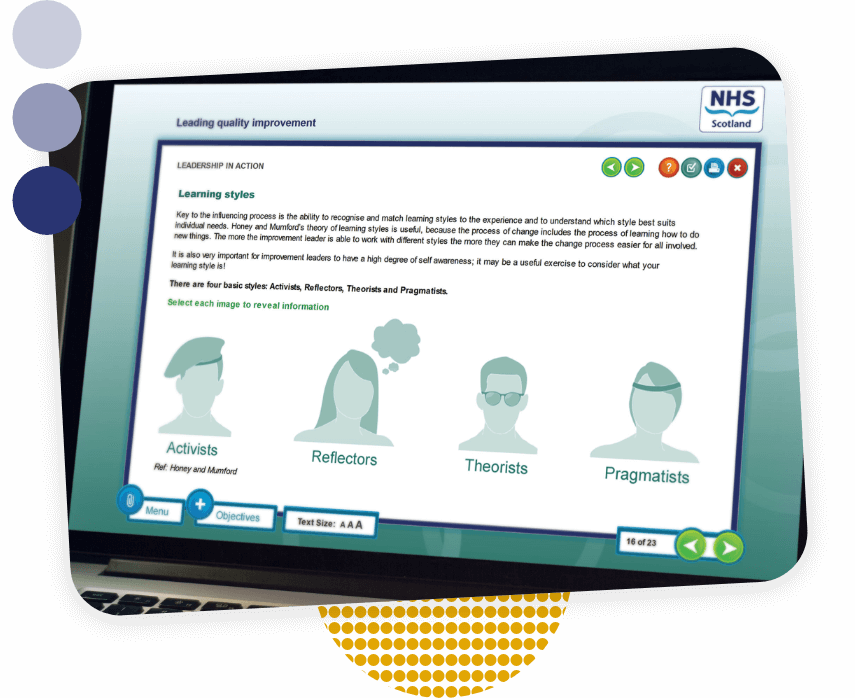Home / Case Studies / NHS Education for Scotland eLearning for Quality Improvement
eLearning Driving Quality Improvement for Front-line, Admin and Management Staff
Setting the Scene
In 2010, the Scottish Government published The Healthcare Quality Strategy for NHS Scotland which set out their ambition for Scotland to be a world leader in healthcare quality. NHS Education for Scotland (NES) is responsible for developing and delivering education and training to all staff across NHS Scotland, and for driving best practice in Quality Improvement (QI). In order to deliver the strategic objectives relating to healthcare quality and continuous improvement, NES launched the Quality Improvement Delivering Quality Improvement through an online national resource Curriculum Framework in 2011. This set out the knowledge and skills required to continuously improve frontline services across NHS Scotland.

The Challenge
The focus on healthcare quality and continuous improvement means that all employees across NHS Scotland must have the knowledge, skills and ability to continuously improve services in their own healthcare environments. NES appointed eCom Scotland to develop a programme of Quality Improvement eLearning resources which would deliver the required knowledge and skills across NHS Scotland and support frontline healthcare services. The potential audience across NHS Scotland is diverse, including front-line clinicians, admin and management staff, and anyone involved in day-to-day implementation of improvement projects. The resources had to deliver the learning outcomes of the Framework and meet the needs identified by key stakeholders for easily available, accessible, and relevant resources.
The Solution
eCom undertook a search of resources (in the UK, US, Europe and Australia), to identify any existing content for the quality improvement eLearning programme. Following this review and gap analysis it was decided to create a suite of 16 QI modules specifically for NHS Scotland. eCom worked in close consultation with NES staff and a small team of subject matter experts. A ‘How to’ document was created to assist content development and face-to-face support provided to the writing team. Course design templates helped to make the content writing process more efficient, reducing project budget and overall completion time. The courses were built using eCom’s authoring tool, eNetAuthor®. This was a complex project with multiple courses, assets and stakeholders and regular meetings between eCom and the NHS team ensured good communication during the development. The modules are aimed at the various levels of staff set out in the Framework. The initial modules focus on introductory Foundation level content to raise awareness across all staff on how improvements can be developed, implemented, and measured. Modules are colour-coded to align with the different levels, to guide the learner through the programme. Learning outcomes are evidenced by knowledge checks, assessments, recording of learner engagement and achievement, and learner feedback. The programme of quality improvement eLearning is accessed through the QI Hub (the Hub), as part of a national resource that can be applied to local problems. They are accessible across a range of technical platforms so that staff can access the eLearning whatever their device, browser, or level of IT expertise.


The Benefits
The Quality Improvement eLearning modules are relevant to a wide range of NHS Scotland staff and are freely available on the QI Hub website. They have increased understanding on a range of QI topics at introductory, practitioner and lead level. Improvement best practice has been brought into the everyday work of NHS Scotland to help staff improve patient healthcare. The resources have also been made available, via the QI Hub, to other public sector organisations to help them with best practice on quality improvement. By planning the full programme of modules from the outset NHS Scotland achieved significant efficiencies in the development process thereby reducing the cost of each individual module. For NHS Scotland staff, successful completion of the modules and assessments can be part of continuing professional development and used as part of the learning and development process.



